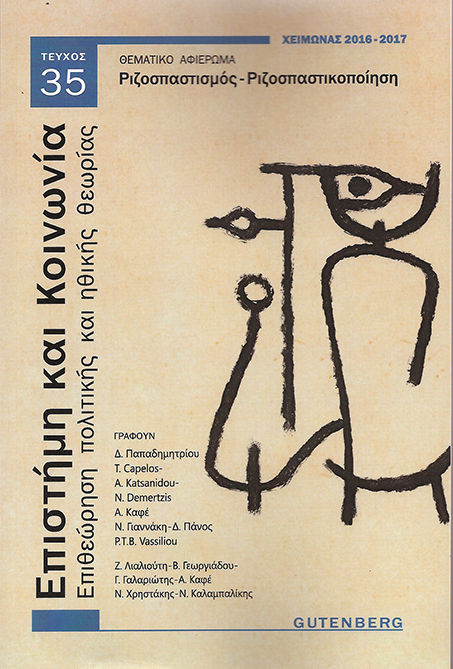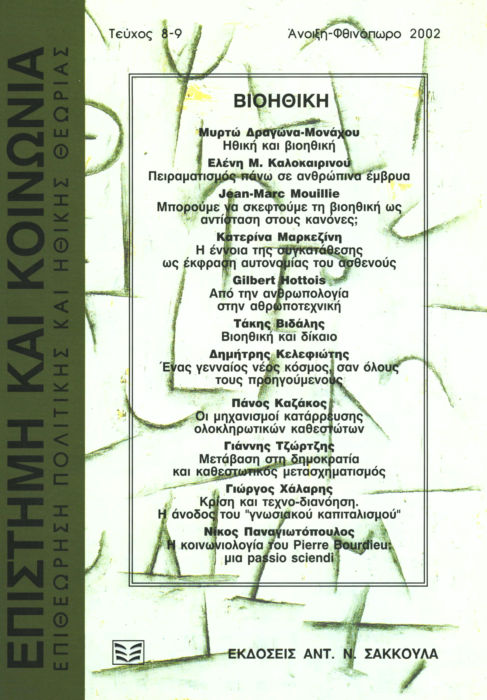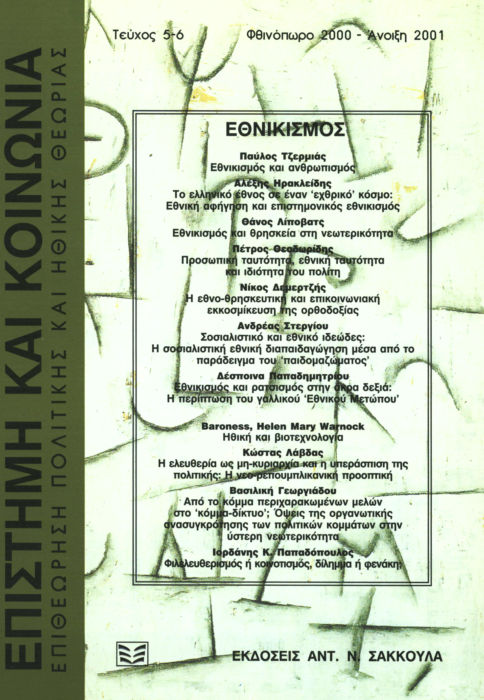«Από την ριζοσπαστικοποίηση στον βίαιο εξτρεμισμό και την τρομοκρατία: επίπεδα ανάλυσης, θεωρητικές προσεγγίσεις και ο ρόλος του Διαδικτύου»

Περίληψη
Περίληψη
Αναμφισβήτητα, το φαινόμενο της ριζοσπαστικοποίησης αποτελεί σήμερα κεντρικό ζήτημα στην παγκόσμια πολιτική ατζέντα, με το ενδιαφέρον να εστιάζεται στην περίπτωση της θρησκευτικής ριζοσπαστικοποίησης και της Ισλαμιστικής τρομοκρατίας. Η ακαδημαϊκή κοινότητα έχει επικεντρώσει τις προσπάθειές της στον προσδιορισμό των παραγόντων και των μηχανισμών της ριζοσπαστικοποίησης, ιδίως εκείνων που οδηγούν στον βίαιο εξτρεμισμό και την τρομοκρατία. Η άσκηση αυτή αποδεικνύεται εξαιρετικά δύσκολη εξαιτίας του πολυπαραγοντικού χαρακτήρα της ριζοσπαστικοποίησης και των ιδιαίτερα ποικιλόμορφων προφίλ των ατόμων που εμπλέκονται σ’ αυτήν. Στην παρούσα εργασία, αναδεικνύεται η σημασία των διαφορετικών (εν δυνάμει «υποστηρικτικών») περιβαλλόντων της ριζοσπαστικοποίησης ενώ, επιπλέον, παρουσιάζονται ορισμένες από τις κυριότερες θεωρητικές προσεγγίσεις του φαινομένου προκειμένου να διαφανεί η ποικιλία και η αλληλόδραση των παραγόντων της ριζοσπαστικοποίησης. Στην συνέχεια, εξετάζεται διεξοδικά η συμβολή του Διαδικτύου, ως «υποστηρικτικό περιβάλλον», στην διαδικασία της ριζοσπαστικοποίησης και της στρατολόγησης, απ’ όπου προκύπτει το συμπέρασμα ότι ο ρόλος του Διαδικτύου είναι τελικά περισσότερο «διευκολυντικός» παρά καθοριστικός.
Abstract
Undoubtedly, the phenomenon of radicalization is now a central issue on the global political agenda, with the emphasis placed mainly on the case of religious radicalization and Islamist terrorism. The academic community has focused its efforts on identifying the factors and mechanisms of radicalization, especially those leading to violent extremism and terrorism. Indeed, this exercise has proved very difficult due to the multifactorial nature of radicalization and the great variety of profiles of people involved in it. This essay highlights the importance of different (potential ‘supportive’) environments of radicalization whilst also presenting some of the main theoretical approaches of the phenomenon in order to indicate the variety and interaction of radicalization factors. Then, it thoroughly examines the contribution of the Internet, as a ‘supportive environment’, in the process of radicalization and recruitment; our conclusion is that the Internet has a more ‘facilitating’ rather than a decisive role.
Λεπτομέρειες άρθρου
- Πώς να δημιουργήσετε Αναφορές
-
Γιαννάκη Ν., & Πάνος Δ. (2017). «Από την ριζοσπαστικοποίηση στον βίαιο εξτρεμισμό και την τρομοκρατία: επίπεδα ανάλυσης, θεωρητικές προσεγγίσεις και ο ρόλος του Διαδικτύου». Επιστήμη και Κοινωνία: Επιθεώρηση Πολιτικής και Ηθικής Θεωρίας, 35, 103–134. https://doi.org/10.12681/sas.10782
- Ενότητα
- Άρθρα

Αυτή η εργασία είναι αδειοδοτημένη υπό το CC Αναφορά Δημιουργού – Μη Εμπορική Χρήση – Παρόμοια Διανομή 4.0.
Οι Συγγραφείς που δημοσιεύουν εργασίες τους σε αυτό το περιοδικό συμφωνούν στους παρακάτω όρους:- Οι Συγγραφείς διατηρούν τα Πνευματικά Δικαιώματα και χορηγούν στο περιοδικό το δικαίωμα της πρώτης δημοσίευσης ενώ ταυτόχρονα τα πνευματικά δικαιώματα της εργασίας προστατεύονται σύμφωνα με την άδεια Creative Commons Αναφορά Δημιουργού - Μη Εμπορική Χρήση - Παρόμοια Διανομή 4.0 Διεθνές , που επιτρέπει σε τρίτους - αποδέκτες της άδειας να χρησιμοποιούν την εργασία όχι για εμπορικούς σκοπούς, με την προϋπόθεση της διατήρησης των διατυπώσεων που προβλέπονται στην άδεια σχετικά με την αναφορά στον αρχικό δημιουργό και την αρχική δημοσίευση σε αυτό το περιοδικό και με διανομή τυχόν τροποποιήσεων υπό την ίδια άδεια όπως και το πρωτότυπο.
- Οι Συγγραφείς μπορούν να συνάπτουν ξεχωριστές, και πρόσθετες συμβάσεις και συμφωνίες για την μη αποκλειστική διανομή της εργασίας όπως δημοσιεύτηκε στο περιοδικό αυτό (π.χ. κατάθεση σε ένα ακαδημαϊκό καταθετήριο ή δημοσίευση σε ένα βιβλίο), με την προϋπόθεση της αναγνώρισης και την αναφοράς της πρώτης δημοσίευσης σε αυτό το περιοδικό.
- Το περιοδικό επιτρέπει και ενθαρρύνει τους Συγγραφείς να καταθέτουν τις εργασίες τους μέσω διαδικτύου (π.χ. σε ένα ακαδημαϊκό καταθετήριο ή στους προσωπικές τους ιστοσελίδες) πριν και μετά από τις διαδικασίες της δημοσίευσης, καθώς αυτό μπορεί να οδηγήσει σε παραγωγική ανταλλαγή ιδεών και σκέψεων καθώς επίσης και σε γρηγορότερη και μεγαλύτερη χρήση και ευρετηρίαση της δημοσιευμένης εργασίας (See The Effect of Open Access).




